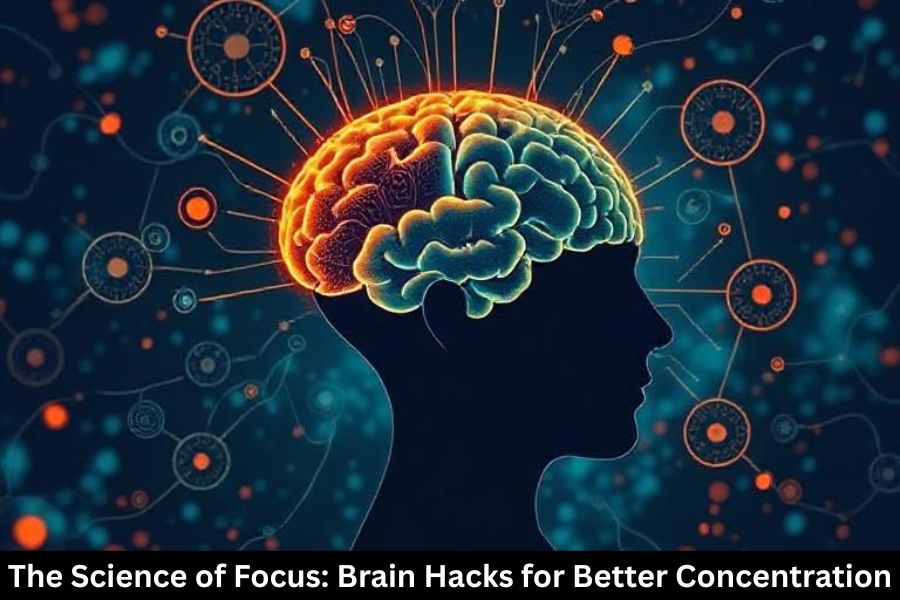We live in a world where distractions are just a tap away. From social media notifications to multitasking habits, maintaining focus is more challenging than ever. But science offers fascinating insights—and practical hacks—that can help you reclaim your concentration and boost productivity.
Understanding Focus: What Happens in the Brain?
Focus is not just willpower—it’s biology. Your brain operates through complex networks of neurons communicating via chemical messengers like dopamine, norepinephrine, and acetylcholine.
Key Brain Regions Involved in Focus
- Prefrontal Cortex: Responsible for decision-making and attention.
- Anterior Cingulate Cortex: Helps control impulses and manage conflicting thoughts.
- Reticular Activating System (RAS): Filters out irrelevant information and helps you stay alert.
Why Do We Lose Focus So Easily?
Let’s face it—our attention spans are shrinking. According to a Microsoft study, the average human attention span is now just 8 seconds. Several factors are to blame:
1. Information Overload
We process over 34 GB of data daily, leading to cognitive fatigue.
2. Multitasking Myths
Multitasking decreases efficiency and increases mistakes. Your brain works better when it concentrates on one task at a time.
3. Poor Sleep and Nutrition
A tired or undernourished brain is like a sluggish computer—slow and glitchy.
Brain Hacks to Supercharge Focus
Ready to sharpen your mind? Here are science-backed techniques that actually work:
1. Try the Pomodoro Technique
Work for 25 minutes, then take a 5-minute break. After four sessions, take a longer break.
Why it works: It aligns with your brain’s natural attention span cycle and prevents burnout.
2. Optimize Your Work Environment
- Reduce clutter
- Adjust lighting
- Play background sounds like white noise or ambient music
Fun fact: Studies show that moderate background noise can enhance creative thinking.
3. Leverage “Attention Anchors”
Use visual cues like sticky notes or desktop widgets to bring your mind back to the task.
Neuroscience tip: These cues reactivate neural circuits related to your task, helping regain momentum.
4. Use Dopamine Wisely
Set small goals and reward yourself when completed.
Hack: Break big tasks into smaller milestones. Checking off each one releases dopamine—a brain chemical tied to motivation and focus.
5. Engage in Regular Physical Exercise
Aerobic activity boosts blood flow and increases brain-derived neurotrophic factor (BDNF), which supports memory and learning.
Try this: Just 20 minutes of brisk walking can significantly enhance attention for hours afterward.
6. Meditate Like a Monk
Mindfulness meditation trains your brain to notice distractions and gently bring attention back.
Study insight: Just two weeks of daily 10-minute meditation sessions can improve cognitive flexibility and sustained attention.
7. Eat Brain-Fueling Foods
Choose:
- Omega-3s (salmon, walnuts)
- Antioxidants (berries, dark chocolate)
- Hydration (water, green tea)
Brain boost: A Mediterranean diet is linked to sharper cognitive function and lower risk of attention disorders.
8. Say No to Notifications
Silence unnecessary apps and schedule “do-not-disturb” focus hours.
Digital detox tip: Try app blockers like Freedom or Forest to stay distraction-free.
9. Try Neurobic Exercises
Unusual brain activities (e.g., brushing your teeth with your non-dominant hand) improve focus by activating underused neural pathways.
Fun trick: Rearrange your desk layout weekly to keep your brain alert.
10. Practice the “Five More Rule”
When you’re about to give up, do five more things—read five more pages, write five more lines, or solve five more problems.
Mental stamina: This helps build endurance and strengthens your attention muscle.
Bonus: Tools to Train Your Brain
Here are some apps and tools you can explore:
- Brain.fm – Music designed for focus
- Lumosity – Cognitive games for memory and attention
- RescueTime – Tracks digital habits
- Notion/Obsidian – Knowledge management tools for organized thinking
FAQs
Q1: Can supplements improve focus?
Yes, supplements like omega-3 fatty acids, L-theanine, and Rhodiola Rosea may support brain function, but consult a healthcare provider first.
Q2: How long should I meditate for better focus?
Start with 5–10 minutes a day and gradually increase. Consistency is key.
Q3: Is caffeine good or bad for focus?
In moderation, caffeine boosts alertness. But overconsumption can lead to jitters and reduced concentration.
Q4: How much sleep is ideal for focus?
Aim for 7–9 hours of quality sleep per night. Deep sleep is critical for memory consolidation and attention.
Q5: Does music help or hurt concentration?
It depends. Instrumental or ambient music can aid focus, while lyrics may be distracting for tasks involving language.



